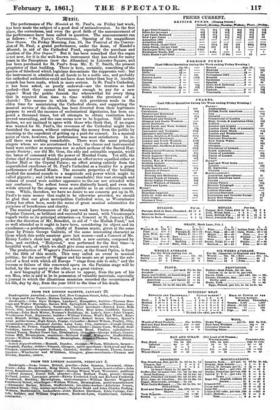Music.
The performance of The Messiah at St. Paul's, on Friday last week, has been made the subject of a good deal of animadversion. In the first place, the correctness, and even the goad faith of the announcement of the performance have been called in question. The announcement ran as follows : " ST. PAUL'S CATHEDRAL. Opening of the magnificent Neto Organ. On Friday Morning, Jan. 25, the Festival of the Conver- sion of St. Paul, a grand performance, under the dome, of Handel's Messiah, in aid of the Cathedral Fund, especially the purchase and erection of the New Organ." But it has been remarked that the organ is not new, for it is the well-known instrument that has stood for many years in the Panopticon now the Alhambra) in Leicester Square, and has been purchased for St. Paul's from Mr. E. T. Smith, the present proprietor of that building. There is here, certainly, something of the species of falsehood which logicians denominate the suppressio veri : but the instrument is admitted on all hands to be a noble one, and probably the cathedral authorities could not have done better than buy it. Another remark has been made, which is more serious. Is St. Paul's Cathedral, it has been asked, so poorly endowed-are the trustees so hard pushed-that they cannot find money enough to pay for a new organ? Must the public furnish the wherewithal for every thing that is required from time to time within the precincts of a church ? The manner in which the rich provisions made in the olden time for maintaining the Cathedral choirs, and supporting the musical service of the church, has been diverted from their legitimate purpose to swell the incomes of ecclesiastical dignitaries, has been ex- posed a thousand times, but all attempts to obtain restitution have proved unavailing, and the case seems now to be hopeless. Still never- theless, we are inclined to agree with those who think that, if an organ was wanted for St. Paul's, the revenues of the Cathedral might have furnished the means, without extracting the money from the public by resorting to the expedient of getting up a paid-for concert. In a musical point of view, however, the performance was most satisfactory. In it- self there was nothing remarkable. There were the same principal singers whom we are accustomed to hear ; the chorus and instrumental band were neither so numerous nor so select as those of the Sacred Har- monic Society ; nor did Mr. Goss, the able and estimable organist, wield the baton of command with the power of Marshal Costa. Yet still, the divine chef d'oeuvre of Handel produced an effect never equalled either at Exeter Hall or the Crystal Palace ; an effect arising entirely from the unparalleled excellence of St. Paul's Cathedral as a locality for a grand performance of Sacred Music. The acoustic properties of the building swelled the musical sounds to a magnitude and power which might be called gigantic ; and (what was most remarkable) this vast strength and volume of sound were neither oppressive to the ear nor attended with any confusion. The softest tones were distinctly heard, and even the words uttered by the singers were as audible as in an ordinary concert room. While, therefore, we have no desire to see concerts got up in St. Paul's to raise money that ought to be otherwise provided, we should be glad that our great metropolitan Cathedral were, as Westminster Abbey has often been, made the scene of great musical solemnities for purposes of beneficence and charity.
The musical performances of the past week have been-the Monday Popular Concert, as brilliant and successful as usual, with Yieuxtemps's superb violin as its principal attraction-a Concert at St. James's Hall, under the direction of Mr. Benedict, in aid of " the Hullah Fund," not so well attended as it ought to have been, considering its object and its excellence-a performance, chiefly of Russian music, given at the same place by Prince George Galitzin, of the same interesting character as those which this noble amateur gave last season-and a Concert of Mr. Henry Leslie's choir last night, at which a new cantata, composed by him, and entitled, " Holyrood," was performed for the first time-a beautiful work, of which we shall give some account next week. The production of Wagner's Tannhauser, at the Grand Opera, is fixed for the 20th of this month. This may called an event in musical politics ; for the merits of Wagner and his music are at present the sub- ject of a feud with which all Europe " rings from side to side," and the success or failure of this renowned opera on the Parisian stage will be hailed, by the one party or the other, as a great vietory. A new biography of Weber is about to appear, from the pen of his son Max, who is said to be in possession of valuable materials, especially a journal in which the illustrious musician recorded the occurrences of his life, day by day, from the year 1816 to the time of his death.


























 Previous page
Previous page